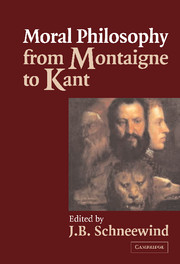Book contents
- Frontmatter
- Contents
- Preface
- Acknowledgments
- Foreword to the One-Volume Reprint
- Introduction
- PROLEGOMENA: SOME QUESTIONS RAISED
- PART I REWORKING NATURAL LAW
- PART II INTELLECT AND MORALITY
- PART III EPICUREANS AND EGOISTS
- Pierre Gassendi
- Pierre Nicole
- Bernard Mandeville
- John Gay
- Claude Adrien Helvétius
- Paul Henri Thiry, Baron d'Holbach
- William Paley
- Jeremy Bentham
- PART IV AUTONOMY AND RESPONSIBILITY
- Supplemental Bibliography
Pierre Gassendi
Published online by Cambridge University Press: 05 June 2012
- Frontmatter
- Contents
- Preface
- Acknowledgments
- Foreword to the One-Volume Reprint
- Introduction
- PROLEGOMENA: SOME QUESTIONS RAISED
- PART I REWORKING NATURAL LAW
- PART II INTELLECT AND MORALITY
- PART III EPICUREANS AND EGOISTS
- Pierre Gassendi
- Pierre Nicole
- Bernard Mandeville
- John Gay
- Claude Adrien Helvétius
- Paul Henri Thiry, Baron d'Holbach
- William Paley
- Jeremy Bentham
- PART IV AUTONOMY AND RESPONSIBILITY
- Supplemental Bibliography
Summary
Introduction
To most contemporary philosophers Pierre Gassendi is known, if at all, as the author of the “Fifth Set of Objections” to Descartes's Meditations. In his own time he was considered a major intellectual figure: philosopher, scientist, historian, and moralist, a leader around whom the opposition to Descartes gathered. Gassendi was born in 1592 in a little town in the south of France. He took a doctorate in theology at Aix in 1614 and was ordained two years earlier. Instead of becoming a parish priest, however, he obtained a chair at the local university and taught philosophy there until 1622. His dissatisfaction with the Aristotelian views he was forced to teach eventually led him to write his first major book. Dissertations in the Form of Paradoxes Against the Aristotelians, of which part was published in 1624. Gassendi then added scientific work to his philosophical inquiries, publishing a number of essays on astronomy as well as some polemical writings in philosophy. He also worked on a study of the philosophy of Epicurus, which he had become determined to discuss and defend as a whole. Some of his Epicurean views were published in 1647 as Eight Books on the Life and Character of Epicurus. In 1649 appeared the Commentary on the Tenth Book of Diogenes Laertius, a massive discussion of Diogenes Laertius's summary of Epicurus's doctrines. All this was preliminary to Gassendi's crowning work, the Syntagma philosophicum (Philosophical Synopsis), which was still unfinished when he died in 1655.
- Type
- Chapter
- Information
- Moral Philosophy from Montaigne to Kant , pp. 353 - 368Publisher: Cambridge University PressPrint publication year: 2002

